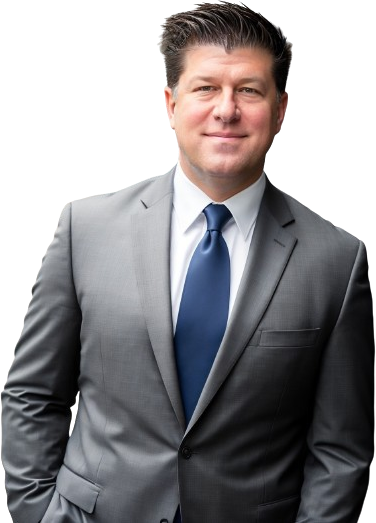
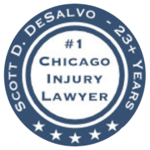

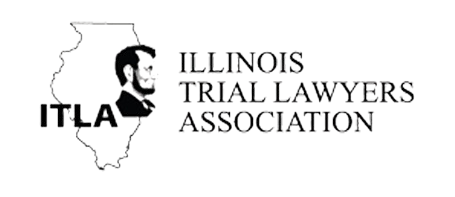
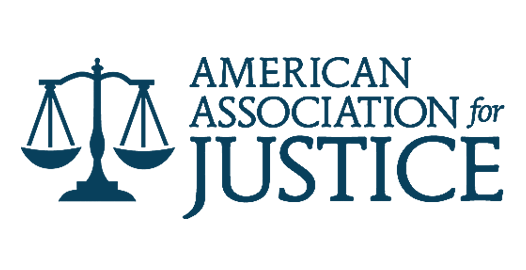
If you've been injured at work anywhere in Chicago, you need a work injury lawyer who understands BOTH workers compensation AND third-party personal injury claims—because sometimes you have both.
I'm Scott DeSalvo. When I was about nine years old, my father, a truck driver and Teamster, was seriously injured at work. He was 35 years old with 3 young kids at home. That work injury and its consequences took everything from him—his ability to work, his livelihood, everything. And it transformed out family. It is hard to even believe, but his case dragged on for 17 years. And at the end of it all, his own lawyer sued him for more fees. That's when I knew exactly what I wanted to do with my life.
My father's case was a Workers Comp case, but they missed out on a third party case because their lawyer only did Workers Comp, not Third Party.
That's why I became a Chicago work injury lawyer. For almost 30 years, I have been making sure what happened to my father NEVER happens to you or your family. Whether you've been hurt at work in Humboldt Park, hurt in a factory in Bedford Park or even in an office in the Loop, I am here to help you and your family.
With me, there is never any money out of pocket. Not a penny. I only get paid when we win. You can call 24 hours a day, 7 days a week, 365 days a year—because injuries don't wait for business hours, and neither should your lawyer.
I've spent over $100,000+ to learn from the best lawyers on the planet -- how to try cases, how to strategize, how to turn insurance company dirty tricks around on them, and how to make a case impossible for an insurance company to win. Not one in 300,000 lawyer have graduated from BOTH the world-renowned Gerry Spence Trial Lawyer's College and the esteemed "The Edge" litigation program. I am relentless in making sure I provide you the absoute best legal representation available anywhere.
And I did it for one reason: so YOU get the very best representation possible.
In my heart, your fight is my fight.

When you're hurt on the job, you are under a lot of pressure. It is easy to make the wrong decision. But choosing the right lawyer menas you get communication and top skills and talent applied with awinning strategy in your case. You need to be paid and you need the medical care necessary to get you abck to work. Work with a guy who can deliver in your work injury case.
Here's what sets me apart:
I've been representing injured workers since 1998—almost 30 years of experience handling thousands of workers' compensation and work injury cases throughout Chicago and Cook County-- and all over Illinois (Dupage, Will, you name it). I've seen every tactic insurance companies use, and I know how to beat them.
This important: most lawyers handle only workers' compensation OR personal injury—not both. I do BOTH, which means I can maximize your total recovery. If defective equipment, a negligent subcontractor, or another driver caused your work injury, you may have BOTH a workers' comp claim AND a third-party lawsuit. Most lawyers miss the third-party claim. I don't. ANd I work on them together to strategically put you in the best, strongest position for maximum money.
Over almost 30 years, I've recovered millions of dollars in workers' compensation benefits and third-party settlements for injured workers. From construction workers to nurses, warehouse employees to delivery drivers—I've helped hundreds of Chicago workers get the compensation they deserve. From Wrigley to West Lawn, Midway and O'Hare, I help people all over Chicago the suburbs.
They're pretty close to the same thing. "Work injury" could mean doing a Workers Comp case or doing a case againstt the person or company who injured you while your were working--or both. Illinois law protects you either way.
Yes, if you have real injuries. Insurance companies deny 30% of initial claims and fight to pay as little as possible. Having a lawyer changes everything—you get more money, faster.
Sometimes YES—if someone OTHER than your employer or co-worker caused your injury. Defective equipment, negligent subcontractors, or other drivers can all be sued. Most lawyers miss these third-party claims. I don't.
Nothing upfront. Workers comp cases: 20% (set by IL law). Third-party cases: 33⅓% (or 40% if we go to trial). No win = no fee.
Don't panic. 30% of initial claims get denied as a tactic. I appeal denied claims and win them all the time. Call 312-500-4500 and let's fight it.
My Chicago office is down the street from the Illinois Workers' Compensation Commission. I walk to hearings. I know the arbitrators and commissioners. We have appeared in those hearing rooms hundreds of times. This location and experience give my clients an advantage.
Can't get to my office because you're injured? No problem. I meet injured workers at their homes, hospitals, rehabilitation facilities, or anywhere convenient. Your recovery is the priority—not travel to a lawyer's office.
Workers' compensation cases: 20% fee (set by Illinois law)
Third-party personal injury cases: 33 1/3% (or 40% if litigation required)
I advance all costs—medical records, expert witnesses, court fees, everything. If we don't win, you don't pay me anything. Zero.
Work injuries happen at all hours. Construction site accidents. Overnight warehouse injuries. Weekend manufacturing accidents. That's why I offer free consultations 24 hours a day, 7 days a week, 365 days a year.
Call me RIGHT NOW at (312)-500-4500. It's free. There's no pressure. Let's talk about your case.
Graduate of Gerry Spence Trial Lawyer's College
Graduate of "The Edge" program
Member of Chicago Bar Association
Member of Illinois Trial Lawyers Association (ITLA)
Member of American Association for Justice (AAFJ)
Dozens of jury trials and hundreds of workers' comp hearings
I've invested over $100,000 in advanced training that most lawyers never pursue. Why? So injured workers get the absolute best representation possible.
I've represented injured workers from virtually every industry and occupation in Chicago. If you've been hurt on the job, I can help—no matter what you do for a living.
Construction & Building Trades
Carpenters, electricians, plumbers, HVAC technicians
Ironworkers, steelworkers, welders, pipefitters
Roofers, masons, concrete workers, bricklayers
Heavy equipment operators (cranes, bulldozers, excavators)
Construction laborers and helpers
Painters, drywall installers, tile setters
Scaffolding workers and riggers
Demolition workers
Road construction workers (IDOT projects)
Manufacturing & Industrial Workers
Factory workers and assemblers
Machine operators and machinists
Forklift drivers and heavy equipment operators
Quality control inspectors
Production line workers
Maintenance technicians and mechanics
Tool and die makers
Caterpillar and John Deere employees
Auto industry workers
Steel mill workers
Glass workers
Chemical plant workers
Warehouse & Logistics
Amazon warehouse workers
UPS drivers and warehouse workers
FedEx drivers and package handlers
Warehouse workers and stock clerks
Delivery drivers (all types)
Material handlers and freight movers
Distribution center employees
Inventory specialists
Shipping and receiving clerks
Healthcare Workers
Registered Nurses (RNs)
Licensed Practical Nurses (LPNs)
Certified Nursing Assistants (CNAs)
Medical technicians and lab workers
Physical therapists and occupational therapists
Home healthcare workers
Hospital staff (all departments)
Nursing home workers
Emergency room staff
Radiology technicians
Pharmacy technicians
Transportation & Delivery
Commercial truck drivers (CDL)
Delivery drivers (Amazon, UPS, FedEx, food delivery)
Rideshare drivers (Uber, Lyft)
CTA bus and train operators
Metra railroad workers
School bus drivers
Taxi and limousine drivers
Ambulance drivers and EMTs
Tow truck drivers
Airline workers (covered by different laws—see below)
Food Service & Hospitality
Restaurant workers (cooks, servers, bartenders, dishwashers)
Hotel staff (housekeeping, maintenance, front desk)
Grocery store workers
Food processing and packaging workers
Catering staff
Bakery workers
Fast food employees
Bar staff
Retail & Office Workers
Retail sales associates
Stock clerks and inventory workers
Cashiers
Office workers and administrative staff
Customer service representatives
Receptionists and secretaries
Data entry clerks
Bookkeepers
Government & Municipal Employees
City of Chicago employees
State of Illinois workers
Road construction crews (IDOT)
Sanitation workers
Park district employees
Public works employees
City hall staff
State troopers (work injuries only—not covered by workers' comp for line-of-duty injuries)
Education
Teachers (all levels)
School staff and administrators
Gym teachers and coaches
Janitors and maintenance staff at schools
Cafeteria workers
Bus drivers and aides
Librarians
Special education staff
Emergency Services & First Responders
Emergency Medical Technicians (EMTs)
Paramedics
911 dispatchers
Emergency room staff
Hospital security
Note: Chicago police officers and firefighters have different benefit systems—see special section below
Service Industries
Security guards
Janitors and custodians (all settings)
Landscapers and groundskeepers
Building maintenance workers
Mechanics and auto technicians
HVAC service technicians
Electricians (service calls)
Plumbers (service calls)
Gym and fitness instructors
Hair stylists and barbers
Dry cleaning workers
Special Categories
Union workers (all trades—I understand union contract benefits)
Undocumented workers (you have rights under Illinois law regardless of immigration status)
Part-time workers (entitled to workers' comp)
Temporary workers (staffing agency employees)
Independent contractors (may actually be employees—I can prove it)
Gig economy workers (complicated status—call me)
If You Don't See Your Job Listed...
Call anyway at (312)-500-4500. I've handled workers' comp cases for virtually every type of worker in Chicago. If you were hurt while working, you likely have rights under Illinois workers' compensation law—and I can help.

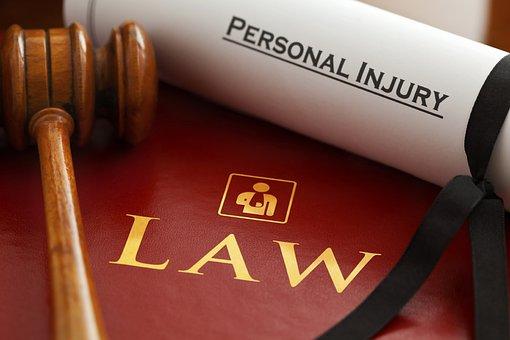

Workplace injuries happen every single day in Chicago. The numbers are staggering, and they represent real people—construction workers, warehouse employees, factory workers, nurses, delivery drivers, and thousands of others just trying to make a living.
Illinois Workplace Injury Statistics:
According to the Bureau of Labor Statistics and the Illinois Workers' Compensation Commission:
Over 150,000 workplace injuries occur in Illinois annually
Construction workers account for approximately 20% of all workplace fatalities
Manufacturing and warehouse workers suffer over 25,000 injuries per year
Healthcare workers experience one of the highest rates of workplace injuries
Transportation and delivery workers face significant injury risks daily
Average workers' compensation claim takes 12-18 months to resolve
Denied claims represent approximately 30% of all initial workers' comp filings
Cook County Workplace Accident Data:
45,000+ workplace injuries reported in Cook County annually
Fatal workplace accidents claim 50-70 workers' lives each year in the Chicago area
Construction site accidents are the leading cause of workplace fatalities
Back and spinal cord injuries are the most common type of work injury
Repetitive stress injuries have increased 40% over the past decade
Common Industries with High Injury Rates in Chicago:
Construction - Falls, equipment accidents, electrocution, struck-by accidents
Manufacturing - Machinery accidents, chemical exposure, repetitive motion injuries
Warehousing/Logistics - Forklift accidents, falling objects, lifting injuries
Healthcare - Needlestick injuries, patient handling injuries, workplace violence
Transportation/Delivery - Vehicle accidents, loading/unloading injuries
Hospitality/Restaurant - Slip and falls, burns, cuts, repetitive stress
What This Means for You:
These number represent real injuries to real injured workers. Each statistic represents a real person, a real family devastated by a work injury. Insurance companies know these numbers too, and they use them to minimize what they pay you. They'll claim your injuries aren't serious, or that you were partially at fault, or that your medical treatment was excessive.
That's why you need an experienced Chicago work injury lawyer who knows how to fight back. Someone who's handled thousands of cases and recovered millions of dollars for injury victims across Chicago and Cook County.
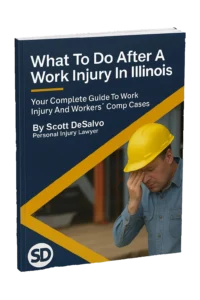
Get Your FREE Copy of...
Your complete guide to work injury and Workers Comp to give you everything you need to know if you or a loved one has been hurt at work.
Some Chicago workers are covered under different worker protection systems—NOT the standard Illinois Workers' Compensation Act. If you're a railroad worker, maritime worker, airline employee, or Chicago police officer/firefighter, special rules apply. Understanding which system covers you is critical to getting the benefits you deserve.
If you work for a railroad—Metra, Amtrak, Union Pacific, BNSF, CSX, Norfolk Southern, or any freight railroad—you are NOT covered by Illinois Workers' Compensation. Instead, you're covered by the Federal Employers' Liability Act (FELA), a federal law dating back to 1908.
FELA is fundamentally different from workers' compensation:
You Must Prove Employer Negligence
Unlike workers' comp (which is no-fault), under FELA you must prove your employer's negligence caused or contributed to your injury. This could be:
Defective equipment or machinery
Inadequate training or supervision
Unsafe work practices or procedures
Failure to maintain safe working conditions
Violation of federal railroad safety regulations
BUT the Benefits Are Much Greater:
Full lost wages (not just 2/3 like workers' comp)
Pain and suffering damages (not available in workers' comp)
Loss of quality of life
Past and future medical expenses
No caps on damages (workers' comp has statutory limits)
Can file in federal or state court
FELA applies to all railroad workers:
Train engineers and conductors
Brakemen and switchmen
Track maintenance workers
Signal maintainers
Carmen (car repairers)
Electricians and mechanics
Clerical staff injured on railroad property
Any worker injured in the course of railroad employment
Why FELA cases are complex:
Railroads have teams of lawyers and investigators who arrive at accident scenes within hours. They take statements, photograph everything, and build a defense before you even leave the hospital. You need an experienced FELA lawyer immediately.
I handle FELA claims for railroad workers injured throughout Illinois. I know the federal regulations. I know how railroads defend these cases. And I know how to prove employer negligence to get you full compensation.
If you're a railroad worker injured on the job, call me immediately at (312)-500-4500. Don't give ANY statement to the railroad's investigators until you talk to me.
If you work on Illinois waterways—the Chicago River, Lake Michigan, Mississippi River, or Illinois River—you may be covered by federal maritime law, not Illinois workers' compensation.
The Jones Act (Merchant Marine Act of 1920)
The Jones Act covers "seamen"—workers who spend a substantial amount of time working aboard vessels. This includes:
Tugboat operators and deckhands
Barge workers
Commercial fishing boat crews
Vessel captains and mates
Marine engineers
Boat pilots
Jones Act benefits include:
Full lost wages (not 2/3 like workers' comp)
Pain and suffering damages
Maintenance and cure (daily living allowance plus medical care until maximum medical improvement)
Must prove employer negligence (like FELA, but burden is lower—even slight negligence qualifies)
In addition to Jones Act negligence claims, injured seamen can sue vessel owners for "unseaworthiness"—failing to provide a seaworthy vessel. This is a strict liability claim (no need to prove negligence). Unseaworthiness includes:
Defective equipment
Inadequate crew
Improper procedures
Dangerous conditions on vessel
Longshore and Harbor Workers' Compensation Act (LHWCA)
If you work on or near navigable waters but don't qualify as a "seaman," you may be covered by the LHWCA. This includes:
Dock workers and longshoremen
Ship loaders and unloaders
Harbor construction workers
Ship repair workers
Marina workers
LHWCA provides workers' comp-style benefits but with different rules and benefits than Illinois workers' comp.
Maritime injury law is highly specialized. If you work on or near water and were injured on the job, call me at (312)-500-4500 to discuss which law covers you and what benefits you're entitled to.
Chicago police officers and firefighters are NOT covered by the Illinois Workers' Compensation Act. This is critical to understand. If you're a Chicago cop or firefighter injured on duty, you're covered by the Chicago Police/Fire Pension Fund, which provides different benefits under different rules.
Three Types of Benefits for Chicago Police and Firefighters:
1. Ordinary Disability Benefits (Injured OFF Duty)
If you're injured outside the line of duty (off-duty injury, non-work-related):
Available ONLY if disabled more than 30 days
Available ONLY if not eligible for regular salary
50% of your pre-injury salary
One year of benefits for every four years of service (maximum 5 years)
Example: 12 years of service = 3 years of ordinary disability benefits
2. Duty Disability Benefits (Injured ON Duty)
If you're injured in the line of duty while performing your duties:
Available if not eligible to receive regular salary
75% of your pre-injury salary (this is the general rule)
Can be reduced to 50% in certain cases depending on circumstances
Payable while unable to perform duties
Can continue for extended periods depending on severity
3. Occupational Disease Benefits (Heart Attacks/Heart Conditions)
Special category for Chicago police/firefighters with:
At least 10 years of service AND
Heart attack or other disabling heart condition
Available if NOT eligible for Duty Disability Benefits
65% of salary
Illinois law presumes heart conditions in police/fire with 10+ years are job-related
Why This Matters:
Chicago police and firefighters injured on duty often don't realize they're NOT in the workers' comp system. Different deadlines apply. Different procedures. Different benefits. If you file the wrong claim with the wrong agency, you can lose benefits.
Even though you can't file workers' comp, you CAN file:
Third-party personal injury claims if someone other than the City caused your injury (vehicle accidents, defective equipment, negligent contractors, etc.)
Section 1983 federal civil rights claims in certain circumstances
State law tort claims in some situations
If you're a Chicago police officer or firefighter injured on duty, call me at (312)-500-4500. I understand your unique benefit system and can help you navigate it while pursuing any third-party claims you may have.

I represent union workers from all trades and industries throughout Chicago. Union members have rights and benefits beyond standard workers' compensation, and I know how to coordinate union contract benefits with workers' comp to maximize your total recovery.
Union contracts often provide:
Disability pay in addition to workers' comp
Continued health insurance during disability
Job protection and return-to-work rights
Union pension benefits
Light duty work provisions
Supplemental accident insurance
Legal defense funds
Unions I've worked with include:
International Brotherhood of Electrical Workers (IBEW)
United Association of Plumbers and Pipefitters (UA)
International Union of Operating Engineers (IUOE)
International Association of Bridge, Structural, Ornamental and Reinforcing Iron Workers
United Brotherhood of Carpenters and Joiners (UBC)
International Brotherhood of Teamsters (IBT)
United Steelworkers (USW)
Service Employees International Union (SEIU)
Unite Here (hospitality workers)
And many others
Why union workers should hire a lawyer who understands union benefits:
Many workers' comp lawyers don't understand union contracts. They settle your workers' comp claim without considering:
Your union disability pay (which might offset what insurance pays)
Your right to return to work under the union contract
Union pension benefits you might be entitled to
Supplemental insurance through the union
I work with union representatives and review your union contract to ensure you get EVERY benefit you're entitled to—both through workers' comp AND your union.
If you're a union member injured on the job, call me at (312)-500-4500. I speak your language and fight for union workers.
Airline workers may be covered by different laws depending on their job duties:
Flight Attendants and Pilots: Generally covered by Railway Labor Act, not state workers' comp
Ground Crew (Ramp Agents, Baggage Handlers): May be covered by Illinois workers' comp
Mechanics: Depends on whether working on aircraft or ground equipment
Airline worker injury law is complex. If you work for United, American, Southwest, or any airline and were injured on the job, call me at (312)-500-4500 to discuss which law covers you.
Occupational Diseases: When Your Illness is Work-Related
Not all work injuries happen in a single accident. Many workers develop diseases and illnesses over time from workplace exposures. Illinois recognizes occupational diseases under the Illinois Occupational Diseases Act (820 ILCS 310/1 et seq.), which provides benefits separate from but similar to the Workers' Compensation Act.
The key difference: Occupational diseases develop gradually from workplace exposures, not from a single traumatic accident.
Find Out What YOUR Case Might Be Worth...for free.
Respiratory Diseases:
Asbestosis - From asbestos exposure (construction, insulation, demolition)
Silicosis - From silica dust (sandblasting, concrete cutting, mining)
Coal Workers' Pneumoconiosis ("Black Lung") - Coal dust exposure
Occupational Asthma - From workplace chemicals, dust, or fumes
Chronic Obstructive Pulmonary Disease (COPD) - From industrial exposures
Berylliosis - From beryllium exposure (aerospace, electronics)
Chemical pneumonitis - From toxic inhalations
Hearing Loss:
Noise-Induced Hearing Loss - The most common occupational disease in Illinois
Caused by prolonged exposure to loud machinery, construction equipment, manufacturing noise, airports, etc.
Must show hearing loss directly related to workplace noise exposure
Can file claim even after retirement if hearing loss occurred during employment
Skin Conditions:
Contact dermatitis from chemicals
Chemical burns
Skin infections from workplace exposures
Allergic reactions to workplace substances
Chloracne from chemical exposures
Repetitive Stress Injuries (Cumulative Trauma):
Carpal tunnel syndrome - From typing, assembly work, tool use
Tendonitis - From repetitive motions
Rotator cuff injuries - From overhead work, reaching, lifting
Back conditions - From repetitive lifting, bending, twisting
Epicondylitis (tennis/golfer's elbow) - From repetitive arm motions
Knee injuries - From constant kneeling, climbing, squatting
Toxic Exposures and Poisoning:
Lead poisoning (construction, battery manufacturing, painting)
Mercury poisoning (dental workers, industrial)
Solvent exposure (painters, cleaners, chemical workers)
Pesticide exposure (agricultural, landscaping)
Chemical poisoning (manufacturing, laboratories)
Cancers Related to Workplace Exposures:
Mesothelioma - Almost always from asbestos exposure (latency period of 20-50 years)
Lung cancer - From asbestos, silica, diesel exhaust, radon, other carcinogens
Bladder cancer - From chemical exposures (rubber, dye, paint industries)
Leukemia - From benzene exposure (petroleum, chemical industries)
Nasal and sinus cancers - From wood dust, certain chemicals
Skin cancer - From prolonged sun exposure (outdoor workers)
Infectious Diseases:
COVID-19 (see detailed section below)
Hepatitis B and C - Healthcare workers from needlestick injuries
Tuberculosis (TB) - Healthcare workers, corrections officers
HIV - Healthcare workers from needlestick exposures
MRSA and other drug-resistant infections
Bloodborne pathogen exposures
Heart Conditions (Special Presumption for First Responders):
For firefighters and police officers with 10+ years of service, Illinois law presumes that heart attacks and heart disease are occupational
The burden shifts to the insurance company to prove it's NOT work-related
Applies to heart attacks, coronary artery disease, and other cardiac conditions
Neurological Conditions:
Peripheral neuropathy from toxic exposures
Chronic toxic encephalopathy (brain damage from chemicals)
Parkinson's disease (linked to pesticide exposure)
Memory and cognitive impairment from solvent exposure
Filing Deadlines for Occupational Diseases
You must file within 3 years of:
The date of disablement (when you become unable to work due to the disease), OR
The date of last exposure to the hazardous condition
You must notify your employer within 90 days of becoming disabled or learning the disease is work-related
For diseases with long latency periods (like mesothelioma from asbestos, which can take 40+ years to develop), the filing deadline starts when you're diagnosed and disabled—not when you were first exposed.
These cases are more complex than injury claims because you must prove:
You have the disease
The disease arose from conditions at work
The workplace exposure was the cause (or a significant contributing cause)
You meet the filing deadlines
I work with medical experts who specialize in occupational medicine to prove your disease is work-related. Industrial hygienists, pulmonologists, toxicologists, and other experts provide opinions linking your disease to workplace exposures.
If you worked for multiple employers over your career and were exposed to the hazardous condition at more than one job, Illinois law allows claims against multiple employers. For example:
Asbestos exposure at several construction jobs over 30 years
Noise exposure from multiple factory jobs
Chemical exposures at different plants
I identify all responsible employers and pursue claims against each to maximize your recovery.
If you believe you have a work-related illness or disease, call me immediately at (312)-500-4500. Occupational disease claims are complex and have strict deadlines. The sooner I'm involved, the better.
Healthcare workers, first responders, and other frontline workers who contracted COVID-19 while working may be entitled to workers' compensation benefits under Illinois law.
Who Qualifies for COVID-19 Workers' Comp Benefits?
Illinois law creates a rebuttable presumption that COVID-19 is work-related for:
Healthcare workers (doctors, nurses, CNAs, medical technicians, home health aides, nursing home staff, hospital employees)
First responders (police officers, firefighters, EMTs, paramedics)
Corrections officers and jail/prison staff
Grocery store workers (during peak pandemic periods)
Other frontline essential workers exposed on the job
"Rebuttable presumption" means: The law presumes you contracted COVID-19 at work. The burden is on the insurance company to prove you didn't—they must show you were exposed elsewhere. This makes it easier for frontline workers to win claims.
For other workers (not in presumed categories): You can still file a COVID-19 workers' comp claim, but YOU must prove you were exposed at work through:
Documented workplace outbreak
Co-worker infections
Customer/client exposure
Employer's failure to provide PPE or follow safety protocols
Benefits Available for COVID-19 Claims
Medical Treatment:
All reasonable and necessary COVID-19 treatment
Hospitalization costs (including ICU, ventilator)
Doctor visits and specialists
Prescription medications
Rehabilitation for long-term effects
Mental health treatment for COVID-related PTSD, anxiety, depression
Lost Wages (Temporary Total Disability):
2/3 of your average weekly wage while unable to work
Tax-free benefits
Covers time in isolation, quarantine, hospitalization, and recovery
Permanent Disability Benefits for "Long COVID":
If COVID-19 causes lasting impairments that affect your ability to work, you may be entitled to:
Permanent partial disability benefits
Wage differential if you can't return to your previous job
Permanent total disability in severe cases of long COVID
Death Benefits:
If COVID-19 proves fatal, family members may receive:
2/3 of the deceased's average weekly wage (up to $500,000 or 25 years, whichever is greater)
$8,000 in burial expenses
Long COVID and Workers' Compensation
"Long COVID" or "Post-Acute Sequelae of SARS-CoV-2" (PASC) includes:
Chronic fatigue
Respiratory problems
Heart issues (myocarditis, POTS)
Cognitive impairment ("brain fog")
Neurological problems
Depression and anxiety
If long COVID prevents you from working or limits your ability to do your job, you're entitled to ongoing workers' comp benefits. I work with pulmonologists, cardiologists, neurologists, and other specialists to document long COVID impairments and prove their impact on your work capacity.
Insurance companies routinely deny COVID-19 claims by arguing:
You were exposed outside of work (family, community)
Your employer provided adequate PPE
You didn't follow safety protocols
Your symptoms are exaggerated
Long COVID isn't a recognized condition
I fight these denials with evidence:
Documented workplace outbreaks
Co-worker infections
Employer's failure to provide proper PPE
Violation of CDC or OSHA guidelines
Medical expert testimony about long COVID
Filing Deadlines for COVID-19 Claims
Under Illinois law, you must:
Notify your employer within 45 days of testing positive or being diagnosed
File your claim within 3 years of diagnosis/disablement
Don't wait. Even if you recovered from acute COVID-19, if you develop long COVID symptoms months later, call me. You may still have a claim.
If you contracted COVID-19 while working as a healthcare worker, first responder, or other essential worker, call me at (312)-500-4500 for a free consultation. I'll evaluate your claim and fight for the benefits you deserve.
Illinois has specific laws protecting injured workers. But navigating the Illinois Workers' Compensation Act is complicated, and insurance companies count on you not understanding your rights. Let me break it down.
Under the Illinois Workers' Compensation Act (820 ILCS 305/1 et seq.), if you're injured on the job, you're entitled to benefits regardless of who was at fault. This is called a "no-fault" system. Your employer's workers' compensation insurance should cover:
All reasonable and necessary medical treatment
Hospital stays and surgeries
Physical therapy and rehabilitation
Prescription medications
Medical equipment (braces, crutches, wheelchairs)
Mileage to and from medical appointments
If you can't work at all while recovering, you receive:
2/3 of your average weekly wage
Tax-free benefits
Payments continue until you return to work or reach maximum medical improvement (MMI)
If you have permanent limitations or loss of use of a body part:
Percentage of disability x statutory rate
Based on AMA guidelines and medical evidence
Can be substantial for serious injuries
Permanent Total Disability (PTD):
If you can never work again due to your injuries:
2/3 of your average weekly wage for life
Must prove inability to perform any gainful employment
Difficult to obtain but potentially worth millions over a lifetime
If you return to work but can't earn what you used to:
2/3 of the difference between old wages and new wages
Payable for the rest of your working life
Can be worth hundreds of thousands of dollars
Vocational Rehabilitation:
Job retraining if you can't return to your old job
Job placement assistance
Education expenses for new career
This is CRITICAL and most injured workers don't know it:
You have the right to choose your own treating physician.
Under Illinois law, you get to pick the doctor who treats your work injury. The insurance company will try to send you to their "company doctor"—a doctor who works for them and consistently minimizes injuries and clears workers to return to work before they're ready.
You must attend the company doctor exam (it's required), but YOU choose who actually treats you. I can refer you to doctors who:
Actually care about helping you recover
Won't minimize your injuries
Will document your condition properly
Will support your claim if the insurance company fights you
This one decision—choosing your own doctor instead of the company doctor—can be worth tens of thousands of dollars to your case.
You must notify your employer within 45 days of your work injury (820 ILCS 305/6). This doesn't mean you have to file a formal claim, but you need to tell your employer, preferably in writing, that you were injured at work.
45 days: Notify employer of injury
3 years: Statute of limitations to file workers' comp claim
2 years: Statute of limitations for third-party personal injury claims
Here's what most injured workers don't know: if someone OTHER than your employer or a co-worker caused your injury, you may have BOTH a workers' compensation claim AND a personal injury lawsuit against the third party.
Examples of third-party work injury claims:
Defective equipment: Injured by a machine? Sue the manufacturer
Vehicle accidents: Delivery driver hit by another driver? Sue that driver
Subcontractor negligence: Injured on a construction site by another company's worker? Sue that company
Premises liability: Injured at a worksite you don't own? Sue the property owner
Product liability: Injured by defective safety equipment? Sue the manufacturer
Third-party claims are worth FAR more than workers' comp alone because you can recover:
Full lost wages (not just 2/3)
Pain and suffering (not available in workers' comp)
Future earning capacity
Punitive damages in some cases
I handle both workers' compensation AND third-party claims for injured workers. Most lawyers only do one or the other. I do both, maximizing your total recovery.
I've spent almost 30 years representing injured workers throughout Chicago and Cook County. I've handled every type of workplace injury imaginable, from construction accidents to repetitive stress injuries to catastrophic injuries that change lives forever.
Construction Accidents
Construction sites are among the most dangerous workplaces in Chicago. I've represented carpenters, electricians, plumbers, laborers, crane operators, and every other trade injured on construction sites.
Common construction accidents:
Falls from heights: Scaffolding collapses, ladder falls, unprotected edges, roof accidents
Struck-by accidents: Falling tools or materials, swinging equipment, vehicle accidents
Caught-in/between: Trench collapses, equipment crushing injuries, caught in machinery
Electrocution: Contact with power lines, defective tools, improper wiring
Equipment accidents: Forklift accidents, crane accidents, power tool injuries
Construction site third-party claims:
Construction sites involve multiple contractors, subcontractors, equipment owners, and property owners. If a subcontractor's negligence or defective equipment caused your injury, you likely have a third-party claim worth far more than workers' comp alone.
Industrial and Manufacturing Accidents
Chicago's industrial and manufacturing facilities employ thousands of workers operating heavy machinery, working with chemicals, and performing repetitive tasks that cause serious injuries.
Common industrial accidents:
Machinery accidents: Caught in presses, conveyors, packaging equipment, assembly line machines
Chemical exposure: Burns, respiratory injuries, toxic exposure, skin conditions
Explosions and fires: Gas leaks, combustible dust, welding accidents
Forklift accidents: Struck by forklifts, falling loads, crushing injuries
Repetitive stress injuries: Carpal tunnel, tendonitis, back injuries from repeated lifting
Machine guarding violations:
OSHA requires proper machine guarding. If defective or missing guards caused your injury, you may have a product liability claim against the manufacturer in addition to workers' comp.
Warehouse and Logistics Injuries
Chicago is a major logistics hub with massive warehouses and distribution centers throughout the area. Amazon, UPS, FedEx, and countless other companies employ tens of thousands of warehouse workers who face daily injury risks.
Common warehouse injuries:
Back and spinal injuries: Heavy lifting, awkward positions, repetitive bending
Forklift accidents: Struck by forklifts, falling pallets, crushing injuries
Slip and fall accidents: Wet floors, debris, uneven surfaces
Falling object injuries: Poorly stacked inventory, dropped items from heights
Repetitive motion injuries: Constant lifting, scanning, packing
Amazon and major employer claims:
Large companies have aggressive legal teams that fight legitimate workers' comp claims. They pressure injured workers to return too soon, deny injuries are work-related, and minimize disabilities. You need an experienced lawyer who won't be intimidated by corporate lawyers.
Healthcare Worker Injuries
Nurses, CNAs, medical technicians, and other healthcare workers have one of the highest rates of workplace injuries in Chicago. Hospitals, nursing homes, and medical facilities are dangerous workplaces.
Common healthcare worker injuries:
Patient handling injuries: Back injuries from lifting patients, pulling patients, repositioning
Needlestick injuries: Exposure to bloodborne pathogens, HIV, hepatitis risks
Workplace violence: Assaults by patients, verbal abuse, physical attacks
Slip and falls: Wet floors, cluttered hallways, rushing between patients
Repetitive stress injuries: Constant patient care, computer work, equipment operation
Delivery drivers, truckers, Uber/Lyft drivers, and other professional drivers face significant injury risks both from vehicle accidents and from the physical demands of loading/unloading.
Common driver injuries:
Vehicle accidents: Crashes, rear-end collisions, intersection accidents
Loading/unloading injuries: Back injuries from lifting packages, slip and falls
Repetitive stress injuries: Getting in/out of vehicles hundreds of times daily
Assault and robbery: Attacks on delivery drivers in dangerous areas
If you're a delivery driver injured in a crash caused by another driver, you have BOTH a workers' comp claim AND a personal injury claim against the at-fault driver. This can result in much higher compensation.
Workers injured in slip and fall accidents at work are entitled to workers' compensation. But if you were injured at a location NOT owned by your employer, you may also have a premises liability claim.
Examples:
Construction worker slips at a client's property
Delivery driver falls at a customer's location
Service technician injured at a facility they're servicing
Sales representative falls at a client's office
Repetitive Stress and Cumulative Trauma Injuries
Not all work injuries happen in a single accident. Many workers develop injuries over time from repetitive motions, awkward positions, or cumulative trauma.
Common repetitive stress injuries:
Carpal tunnel syndrome: From typing, assembly work, tool use
Rotator cuff injuries: From overhead work, reaching, lifting
Back injuries: From repeated lifting, bending, twisting
Tendonitis: From repetitive motions in hands, elbows, shoulders
Knee injuries: From constant kneeling, climbing, standing
Illinois recognizes repetitive trauma claims: You don't need a single accident. If your job duties caused your injury over time, you're entitled to workers' compensation benefits (820 ILCS 305/1(d)).
Some work injuries change everything. Paralysis. Traumatic brain injuries. Amputations. Burns. These catastrophic injuries don't just affect the worker—they devastate entire families.
My father's catastrophic injury took everything from our family. I understand what you're facing. I know what it's like to watch your family struggle because of a workplace injury. That's why I fight so hard for workers with catastrophic injuries.
Catastrophic work injuries include:
Spinal cord injuries and paralysis: Falls, crushing injuries, vehicle accidents
Traumatic brain injuries: Falls, struck-by accidents, explosions
Amputations: Machinery accidents, caught-in equipment, crushing injuries
Severe burns: Chemical exposure, electrical accidents, explosions, fires
Loss of vision or hearing: Chemical exposure, explosions, head trauma
Multiple fractures and broken bones: Falls, struck-by accidents, vehicle crashes
Catastrophic injury claims require:
Life care planning to calculate lifetime medical costs
Vocational experts to prove inability to work
Economic experts to calculate lifetime lost earnings
Pursuit of permanent total disability benefits
Aggressive third-party claims when applicable

Over almost 30 years, I've helped hundreds of injured Chicago workers recover millions of dollars in compensation. Every case is different, but here are examples of results I've achieved:
Construction Accident Settlements:
$1,250,000 - Construction worker fell from scaffolding, spinal cord injury, permanent disability (workers' comp + third-party claim against general contractor)
$875,000 - Electrician electrocuted by defective equipment (workers' comp + product liability claim)
$725,000 - Carpenter struck by falling materials, traumatic brain injury
$550,000 - Construction laborer injured in trench collapse (workers' comp + third-party claim)
$425,000 - Roofer fell through unprotected opening, multiple fractures
Industrial Accident Settlements:
$950,000 - Factory worker caught in machinery, amputation of fingers (workers' comp + product liability)
$675,000 - Warehouse worker struck by forklift, back injury requiring surgery
$525,000 - Manufacturing worker injured by defective press, shoulder injury
$385,000 - Chemical exposure causing respiratory injury and disability
Workers' Compensation Awards:
$450,000 - Permanent total disability award for back injury preventing all work
$325,000 - Wage differential award for injured worker forced into lower-paying job
$275,000 - Permanent partial disability for shoulder injury
$185,000 - Multiple injuries requiring surgeries and extensive treatment
Third-Party Work Injury Claims:
$825,000 - Delivery driver injured by drunk driver while working
$575,000 - Worker injured at client site due to dangerous property condition
$495,000 - Service technician injured by defective equipment
$375,000 - Nurse injured in vehicle accident en route to patient home visit
Repetitive Stress Injury Claims:
$225,000 - Carpal tunnel and shoulder injuries from assembly line work
$165,000 - Back injury from repetitive lifting at warehouse
$145,000 - Rotator cuff injury from overhead work
These results demonstrate what's possible when you have an experienced Chicago work injury lawyer who understands both workers' compensation AND third-party personal injury claims. Insurance companies know I'm willing to fight, and they take my clients' claims seriously.
Past results do not guarantee future outcomes, but they show my commitment to getting injured workers every dollar they deserve.

My father was a Teamster, a truck driver, catastrophically injured at work when I was just nine years old. His injury changed our family forever. We grew up poor. His 17-year battle with workers' compensation and his own lawyers taught me everything about what's wrong with the system—and motivated me to spend my career fixing it for other families.
I've been a licensed attorney since 1998, and I've dedicated my entire career to representing injured workers—never insurance companies, never corporations. Just regular working people like my father, like you, who got hurt on the job and need someone to fight for them.
I've had dozens of jury trials in personal injury cases and appeared before the Illinois Workers' Compensation Commission hundreds of times. I've taken on every major workers' compensation insurance carrier in Illinois—Travelers, Liberty Mutual, Hartford, Gallagher Bassett, Broadspire, all of them.
My workers' compensation experience includes:
Hundreds of hearings before arbitrators and commissioners
Dozens of trials on disputed claims
Appeals to the Illinois Workers' Compensation Commission
Appeals to the Illinois Appellate Court
Emergency 19(b) petitions to force immediate medical care
Section 19(h) petitions to change treating physicians
Section 8(a) disputes over medical treatment
Wage differential claims under Section 8(d)(1)
Permanent total disability claims under Section 8(f)
Insurance companies and their lawyers know I understand the Workers' Compensation Act inside and out. They know I've tried cases and won. They know I won't back down. That's why my clients get better settlements.
I've spent over $100,000 on advanced trial training that most lawyers never even consider:
Graduate of the world-renowned Gerry Spence Trial Lawyer's College - Intensive trial advocacy training
Graduate of the prestigious "The Edge" program - Advanced settlement and trial techniques
Continuous education in workers' compensation law and personal injury litigation
Member of the Chicago Bar Association - Active in the legal community
Member of the Illinois Trial Lawyers Association (ITLA) - Protecting injured workers' rights
Member of the American Association for Justice (AAFJ) - National advocacy for injury victims
Member of the Workers' Compensation Lawyers Association - Specialized focus on work injuries
Not one in 10,000 lawyers has completed the training I have. I did it for one reason: so injured workers get the very best representation possible.

My office is in downtown Chicago—down the street from the Illinois Workers' Compensation Commission. I walk to hearings. I know the arbitrators and commissioners. I've appeared in these hearing rooms hundreds of times over almost 30 years.
But I also come to you. I meet injured workers at their homes, at hospitals, at coffee shops in their neighborhoods—wherever you're comfortable. I've represented construction workers from job sites all over Chicago, warehouse workers from facilities throughout Cook County, and injured workers from every industry and neighborhood.
I Handle BOTH Workers' Comp AND Third-Party Claims
Most lawyers do one or the other. I do both. This means I can:
Maximize your total compensation by pursuing all available claims
Coordinate workers' comp and third-party cases for best results
Identify third-party defendants other lawyers miss
Handle complex cases involving multiple insurance companies
My father was treated terribly by his workers' comp lawyers. That will NEVER happen with me. When you call my office, you get personal attention. Your calls get answered. Your questions get answered. You're not just a case number.
I've developed systems that help me discover more about your case, earlier. I identify third-party claims other lawyers miss. I document injuries properly from day one. I beat the insurance company to the punch.
Workers' compensation cases: 20% fee (set by Illinois law)
Third-party personal injury cases: 33 1/3% (or 40% if litigation required)
I advance all costs. If we don't win, you don't pay me a penny.
Available 24/7/365
Work injuries don't happen on a schedule. That middle-of-the-night construction accident. The weekend warehouse injury. The holiday manufacturing accident. Call me anytime at (312)-500-4500.
Hiring Scott was one of the best moves I have made in my life. Scott is a down to earth person and attorney. Scott is a 5 star first class act who really knows his stuff. The Judge said his presentation was one of if not the best he had ever seen. Take my advice, hire Scott I’m sure you’ll be 200% satisfied I was.

Scott not only cares about the case, but he truly cares about his clients and that makes him the best lawyer I have ever met and hired! He won my case! He is thorough in everything he does. I highly recommend Scott, and will always refer him to family and friends.

I hired Scott DeSalvo upon a friend’s recommendation. His office kept me informed of developments as they happened, and I felt the settlement reached was fair considering my injuries. I would highly recommend Scott DeSalvo to represent your personal injury case.

Robert Martinez - Construction Worker, Back Injury
"I fell off a ladder at a construction site and hurt my back bad. The workers comp insurance company denied everything, said I wasn't really hurt. Scott fought for me and got me surgery, disability benefits, and then went after the general contractor for not providing a safe ladder. He got me over $400,000 total. He changed my life."
Jennifer Thompson - Warehouse Worker, Shoulder Injury
"I hurt my shoulder at work from lifting. My employer made me see their company doctor who said I was fine and sent me back to work. Scott got me to a real doctor who found I needed surgery. He fought the insurance company every step and got me paid while I recovered. I'm grateful every day."
Michael Johnson - Factory Worker, Amputation
"I lost three fingers in a machine accident. Scott not only got my workers comp benefits, but he found out the machine was defective. He sued the manufacturer and got me a settlement that lets me support my family even though I can't do the same work anymore. He's a fighter."
David Rodriguez - Delivery Driver, Back Injury from Crash
"I was delivering packages when a drunk driver hit me. I didn't know I could sue the other driver since I was working. Scott explained I had both workers comp and a personal injury case. He handled both and got me over $600,000. Without him, I would have only gotten a fraction of that."
Sarah Williams - Nurse, Back Injury from Patient Lifting
"After 15 years as a nurse, my back gave out from lifting patients. The hospital's insurance company fought my claim, said it wasn't work-related. Scott proved my injury was from years of patient care. He got me permanent disability benefits and a wage differential because I can't do floor nursing anymore."
These testimonials are real, written in my clients' own words, on file at my office. I build relationships with injured workers. I fight for them like family. That's why they refer their friends and family members to me.

Most injured workers have never dealt with workers' compensation before. The system is confusing, insurance companies are intimidating, and you're worried about your job, your health, and your family. Let me walk you through exactly what happens.
Step 1: Immediate Actions After Your Work Injury
Report the injury immediately - Tell your supervisor or employer within 45 days (preferably in writing). Keep a copy of your report.
Seek medical treatment - Get medical care right away. If it's an emergency, go to the ER. For non-emergencies, tell your employer you need treatment.
Don't give recorded statements to insurance adjusters - Be polite but say you need to speak with a lawyer first.
Document everything - Photos of the injury, accident scene, equipment involved, witnesses present.
Call me at (312)-500-4500 - The sooner I get involved, the better I can protect your rights. My consultation is free.
Step 2: Choosing Your Doctor (CRITICAL)
The insurance company will try to send you to their "company doctor." You must attend the exam (it's required), but YOU have the right to choose your own treating physician.
I can refer you to:
Doctors who actually care about helping you recover
Orthopedic surgeons, pain management specialists, neurologists
Physical therapists and rehabilitation facilities
Doctors who won't minimize your injuries
Doctors who will properly document your condition
This decision alone can be worth tens of thousands of dollars to your case.
Step 3: Filing Your Workers' Compensation Claim
I file your Application for Adjustment of Claim with the Illinois Workers' Compensation Commission. This starts the official process.
The claim includes:
Your employer and insurance information
Description of how the injury occurred
Nature and extent of your injuries
Medical treatment received
Lost time from work
The insurance company has 30 days to respond:
Accept the claim and pay benefits (rare)
Deny the claim entirely (common)
Accept some parts, deny others (very common)
Step 4: Emergency Relief When Necessary
If the insurance company denies benefits or medical treatment you need urgently:
Section 19(b) Petition:
I can file an emergency petition to force the insurance company to pay for medical treatment, including surgery, while the case is pending. We get a hearing within weeks.
Section 19(h) Petition:
If you're stuck with a company doctor who won't properly treat you, I file to change your treating physician to a doctor who will actually help you.
Step 5: Medical Treatment and Documentation
Your doctor provides treatment and documents your:
Diagnoses
Treatment plan
Work restrictions
Disability ratings
Permanency evaluations
Prognosis and future medical needs
I stay in constant contact with your medical providers and obtain all records and reports needed to prove your case.
Step 6: Maximum Medical Improvement (MMI)
When your doctor says you've recovered as much as you're going to, you've reached MMI. At this point:
Your doctor assigns a permanency rating (if applicable)
We can fully evaluate your claim's value
We know your work restrictions
We can calculate permanent disability benefits
Step 7: Settlement Negotiations
I prepare a comprehensive settlement demand showing:
All medical expenses
All lost wages (TTD benefits)
Permanent disability rating and benefits owed
Future medical needs
Wage differential if you can't return to same work
Third-party claim potential
The insurance company responds with:
A counter-offer (usually much lower)
More medical evaluations (trying to reduce your rating)
Surveillance (trying to catch you doing activities they claim you can't do)
I negotiate back and forth, fighting for every dollar you deserve.
Step 8: Arbitration Hearing (If No Settlement)
If we can't reach a fair settlement, we go to arbitration before a workers' compensation arbitrator. This is like a trial but less formal.
At arbitration:
Your medical records are admitted as evidence
You testify about your injury and how it affects your life
Your doctor's reports are submitted
The insurance company may present their doctor's reports
I argue why you deserve full benefits
The arbitrator issues a written decision (usually 4-6 weeks after hearing)
I've handled hundreds of arbitration hearings. I know the arbitrators. I know what evidence wins cases. I know how to present your claim effectively.
Step 9: Appeals (If Necessary)
If we disagree with the arbitrator's decision, I can appeal to:
Illinois Workers' Compensation Commission (three-commissioner panel review)
Illinois Appellate Court (if Commission decision is unfavorable)
I've handled appeals at both levels and won significant reversals for injured workers.
Step 10: Third-Party Personal Injury Claims
While your workers' comp case proceeds, I simultaneously investigate potential third-party claims:
Defective equipment manufacturers
Negligent subcontractors on construction sites
At-fault drivers if injured in work-related vehicle accident
Negligent property owners where you were injured
Third-party claims follow the same process as any personal injury case—investigation, demand, negotiation, lawsuit if necessary, potential trial.
Timeline Expectations:
Simple accepted claims: 6-12 months to final settlement
Disputed claims: 12-24 months through arbitration
Complex claims with appeals: 24-36 months
Third-party claims: 12-36 months depending on complexity
I always push cases forward as quickly as possible, but I never rush you to settle for less than you deserve.
Types of Benefits Available Under Illinois Workers' Compensation Law
Illinois workers' compensation provides multiple types of benefits. Most injured workers don't know everything they're entitled to. Insurance companies hope you won't ask. Let me break down EVERY benefit available to you.
Medical Benefits (Section 8(a))
You're entitled to:
All reasonable and necessary medical treatment
Emergency room visits
Hospital stays and surgeries
Orthopedic care, pain management, physical therapy
Prescription medications
Medical equipment (braces, crutches, wheelchairs, prosthetics)
Home health care if needed
Mileage reimbursement to medical appointments (current federal rate)
Key points:
Medical benefits have NO cap or time limit
You choose your treating physician (not the insurance company)
Pre-approval is NOT required for treatment your doctor recommends
If insurance denies treatment, I file a Section 19(b) petition to force payment
Temporary Total Disability - TTD (Section 8(b))
If you're completely unable to work while recovering:
2/3 of your average weekly wage (AWW)
Tax-free benefits
Payments continue until you return to work or reach MMI
No waiting period if off work more than 3 days
Retroactive to day 1 if off work more than 14 days
Example: If you earn $900/week, your TTD rate is $600/week (2/3 x $900).
Temporary Partial Disability - TPD (Section 8(a))
If you return to light duty work at reduced wages:
2/3 of the difference between your old wages and new wages
Encourages return to work while protecting your income
Example: You earned $900/week. You return to light duty earning $500/week. You receive $267/week TPD (2/3 x $400 difference).
Permanent Partial Disability - PPD (Sections 8(d), 8(e))
When you have permanent limitations or loss of use of a body part:
Scheduled Loss Awards - Section 8(e):
For specific body parts with set number of weeks:
Hand: 205 weeks
Arm: 253 weeks
Foot: 167 weeks
Leg: 215 weeks
Eye: 162 weeks
Thumb: 76 weeks
Other fingers, toes: varies
Calculation: Percentage of loss x weeks for body part x 60% of your AWW
Example: 30% loss of use of hand = 30% x 205 weeks x 60% of $900/week = $33,210
Whole Person Awards - Section 8(d)(2):
For injuries to the back, neck, or other non-scheduled body parts:
Based on percentage of whole person disability
Doctor assigns disability rating using AMA Guidelines
Payment amount depends on age and disability percentage
Can be worth $50,000 to $200,000+ for serious injuries
Man-as-a-Whole Awards:
For injuries affecting multiple body parts or your overall condition:
More comprehensive evaluation
Can result in higher compensation
Requires experienced medical evaluation
Permanent Total Disability - PTD (Section 8(f))
If you can NEVER work again due to your injuries:
2/3 of your average weekly wage
For the rest of your life
Subject to maximum weekly rate (changes annually)
Must prove inability to perform ANY gainful employment
PTD is worth millions over a lifetime: If you're 40 years old earning $900/week and awarded PTD, that's $600/week for life—potentially $1.5+ million in lifetime benefits.
Qualifying for PTD is difficult but possible with:
Severe spinal cord injuries/paralysis
Traumatic brain injuries
Loss of both hands, arms, feet, legs, or eyes
Other catastrophic injuries preventing all work
Strong medical evidence and vocational analysis
I've won PTD awards for workers insurance companies said didn't qualify. It requires aggressive advocacy and thorough preparation.
Wage Differential - Disfigurement (Section 8(d)(1))
If you return to work but can't earn what you used to:
2/3 of the wage difference
Payable for the rest of your working life
Must prove inability to earn pre-injury wages due to work restrictions
Example: You earned $50,000/year. Due to work restrictions, you can now only earn $30,000/year. You're entitled to 2/3 x $20,000 = $13,333/year for your remaining working life.
At age 40 with 25 years left in workforce: $13,333 x 25 years = $333,325 in wage differential benefits.
This benefit is HUGE and insurance companies fight it hard. They'll argue you could earn more if you tried harder, that jobs are available, that your restrictions aren't that limiting. I fight back with vocational experts, labor market surveys, and proof of your actual limitations.
Disfigurement Benefits (Section 8(c))
For permanent, serious disfigurement to areas normally exposed:
Face, head, neck, hands, arms below elbow
Separate from other disability benefits
Up to 162 weeks of compensation
Based on severity and prominence of scarring
Amount depends on:
Location and size of scarring
Visibility of disfigurement
Impact on appearance
Your age and occupation
Vocational Rehabilitation (Section 8(a))
If you can't return to your old job:
Job retraining and education
Job placement assistance
Testing and evaluation
Modified work trial periods
Insurance companies must pay for:
Reasonable and necessary retraining
Community college courses or trade school
Certification programs
Books and materials
Death Benefits (Section 7)
If a work injury causes death:
Spouse receives: 2/3 of deceased's AWW until remarriage, then lump sum
Children receive: Benefits until age 18 (or 23 if full-time student)
Burial expenses: Up to $8,000
Dependency benefits: for other dependents in some cases
Wrongful death lawsuits: Families may also have wrongful death claims against third parties who caused the fatal injury.
Comprehensive FAQ: Your Work Injury Questions Answered

I proudly represent injured workers throughout Chicago and the greater Chicagoland area. No matter where you work or where your injury occurred, I'm here to fight for you.
Chicago Neighborhoods We Serve:
Downtown and Loop Area
North Side: Lincoln Park, Lakeview, Wrigleyville, Uptown, Rogers Park, Andersonville, Lincoln Square, Ravenswood, Albany Park, Edgewater
South Side: Hyde Park, Bronzeville, Bridgeport, Beverly, South Shore, Woodlawn, Englewood, Auburn Gresham, Chatham, Roseland, Pullman
West Side: Pilsen, Little Village, Austin, Garfield Park, Humboldt Park, Logan Square, Wicker Park, Bucktown, Ukrainian Village, West Town
Near North: River North, Streeterville, Gold Coast, Old Town
Near South: Chinatown, Printer's Row, South Loop, Bronzeville
Common Construction Sites:
Downtown high-rise construction
O'Hare Airport expansion and maintenance
Midway Airport projects
CTA rail and station construction
IDOT highway construction throughout Cook County
Commercial developments in suburbs
Residential construction across all neighborhoods
Major Industrial Areas:
Bridgeport industrial corridor
Back of the Yards warehouse district
South Side manufacturing facilities
Western Avenue industrial areas
Elston Avenue industrial corridor
Goose Island industrial area
Cook County Suburbs:
North Suburbs: Evanston, Skokie, Wilmette, Glenview, Northbrook, Des Plaines, Park Ridge, Niles, Morton Grove, Lincolnwood
Northwest Suburbs: Arlington Heights, Schaumburg, Palatine, Mount Prospect, Elk Grove Village, Rolling Meadows, Hoffman Estates, Streamwood
West Suburbs: Oak Park, Berwyn, Cicero, Maywood, Oak Brook, Elmhurst, Lombard, Villa Park, Westchester
Southwest Suburbs: Burbank, Oak Lawn, Evergreen Park, Chicago Ridge, Orland Park, Tinley Park, Palos Hills, Palos Heights
South Suburbs: Blue Island, Calumet City, Dolton, Harvey, Markham, South Holland, Lansing, Riverdale, Calumet Park
Other Counties:
I also represent injured workers in:
DuPage County: Naperville, Wheaton, Downers Grove, Lombard, Carol Stream
Lake County: Waukegan, North Chicago, Gurnee, Mundelein, Vernon Hills
Will County: Joliet, Bolingbrook, Romeoville, Plainfield
Kane County: Aurora, Elgin, St. Charles, Batavia
Industries I Represent Throughout the Area:
Construction and building trades
Manufacturing and industrial
Warehousing and logistics (Amazon, UPS, FedEx, etc.)
Healthcare (hospitals, nursing homes, home healthcare)
Transportation and delivery
Hospitality and restaurants
Retail and service industries
Municipal workers and government employees

Look, if you've been injured at work, you're facing one of the most stressful situations of your life. You're hurt. You can't work. Medical bills are piling up. Your family is worried. And the insurance company is making everything harder instead of helping.
I know exactly what you're going through. My father was catastrophically injured at work when I was nine years old. I watched our family struggle for 17 years while workers' compensation insurance and lawyers failed us. That's why I became a work injury lawyer—to make sure no worker goes through what my father did.
Here's my promise: no money out of pocket. Zero. I only get paid when YOU get paid. If we don't win, you don't owe me a penny.
I advance all costs—medical records, expert witnesses, court costs, everything. You never pay out of pocket.
Here's How to Get Started:
It's easy and zero pressure. I never chase clients. I never hustle and harass people. We talk like friends.
Step 1: Call me at (312)-500-4500 anytime—24 hours a day, 7 days a week, 365 days a year
Step 2: I listen to what happened and answer your questions about workers' comp and your rights
Step 3: I tell you honestly what I can do for you and whether you have a third-party claim in addition to workers' comp
Step 4: You decide if you want to hire me—your choice, no pressure
Step 5: If you hire me, I immediately start protecting your rights, getting you medical care, and fighting the insurance company
Even if you decide not to hire me, we'll end up as friends. Sound good?
The clock is ticking:
45 days to notify your employer (preferably in writing)
3 years statute of limitations to file workers' comp claim
2 years statute of limitations for third-party personal injury claims
Plus:
Evidence disappears (accident scenes get cleaned up, witnesses forget)
Insurance companies are already building a case against you
Delayed reporting gives them ammunition to deny your claim
The sooner I'm involved, the better I can protect your rights
Every day you wait, your case gets weaker.
Remember My Promise:
Workers' Comp Cases: 20% fee (Illinois law)
Third-Party Cases: 33 1/3% (or 40% if litigation)
Call Work Injury Attorney Scott DeSalvo today at (312)-500-4500.
I'm located in Oak Brook, Illinois and in downtown Chicago—right down the Illinois Workers' Compensation Commission. But I can come to you. I meet injured workers at their homes, hospitals, or anywhere convenient.
I look forward to hearing from you and fighting for every dollar you deserve under Illinois workers' compensation law—and beyond.
>> Go To Main Topic Page

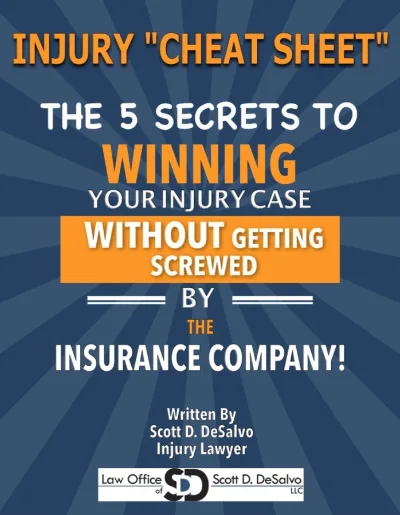

Scott DeSalvo founded DeSalvo Law to help injured people throughout Chicago and surrounding suburbs. Licensed to practice law in Illinois since 1998, IARDC #6244452, Scott has represented over 3,000 clients in personal injury, workers compensation, and accident cases.
No Fee Unless You Win | Free Consultation | 24/7 Availability Call or Text: (312) 500-4500
>>Read More
Main Office:
1000 Jorie Blvd Ste 204
Oak Brook, IL 60523
New Cases: 312-500-4500
Office: 312-895-0545
Fax: 866-629-1817
service@desalvolaw.com
Chicago and Other Suburban Offices
By Appointment Only